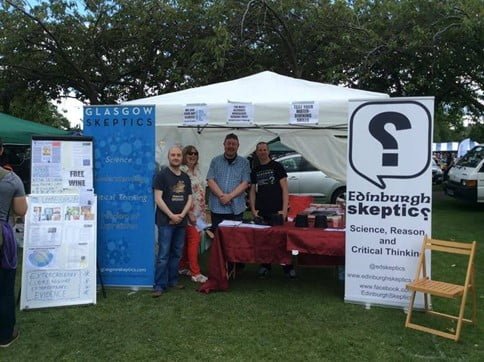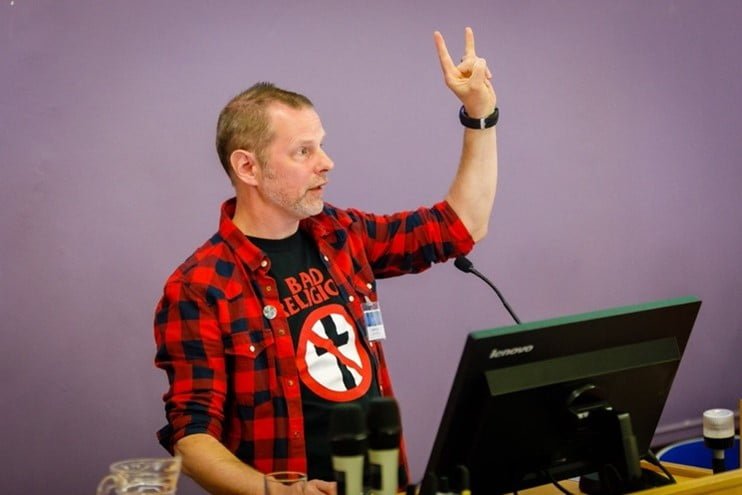I took over running Glasgow Skeptics back in 2015 when the group’s founder inconsiderately got himself a great job in London with Humanists UK. That meant either the group would die, or I’d have to step up and take over. I’ve got over 150 face to face talks under my belt since then, plus a bundle of other special events and activities, so I like to think I’ve got a reasonable amount of insight into what it takes to run a successful group. I made lots of mistakes along the way though, but I’ve done that so that you don’t have to. You’re welcome!
So, with that in mind, here’s my top ten countdown of things NOT to do when running a skeptics group:
10: Don’t be an island
As awesome as you may well be, you can’t do this on your own. I’ve got a crack team of evil henchpersons to help me run my group, and they have saved me multiple times when life has got in the way. I’ve also leaned heavily on other Skeptic groups, most notably our closest neighbours over in Edinburgh. Sharing speakers, travel expenses, cross promotions, and joint efforts running stalls to raise public awareness at various events. The wider network of Skeptics groups are a great resource too (more on that later).

Outside of Skeptical circles, we’ve also teamed with other organisations like Glasgow Science Centre, Café Scientifique, Humanist Society Scotland, and Sense About Science to name a few. Local academic institutions can play a large part as well. We in Glasgow are lucky to have a plethora of Universities within walking distance of our regular venue, and plenty more within reasonable travelling distance – so we’ve got an almost endless supply of potential speakers.
In addition, make sure you’re not on a literal island, unless it’s a big one that’s well populated. You need to be somewhere with a decent population size to get enough rear-ends on seats at your events, and to be able to find a reasonable pub or other venue that’s hopefully got the holy trinity of a function room (ideally one that’s accessible), a projector, and a PA system. You shouldn’t limit yourselves to a Pub of course. Some of our events have been hosted in theatres, libraries, Universities, and bookstores too – occasionally at a cost, but other times as part of a mutual back-scratching exercise (see below).
9: Don’t be shy
The Skeptics community appears to be a bit of a magnet for the socially awkward, which can be a bonus, because some of those people can be the best of friends and allies once you get to know them. But, running a Skeptics group means you have to be bold with how you approach and interact with potential speakers, with attendees at your events, and with other organisations that you might want to partner with (see above). Those who have met me in person may be fooled by my bravado, but my stomach is frequently in knots as I head into town for our events. Meeting people for the first time is difficult. I’ve really honed my small talk skills so they look almost natural. I’d recommend you do the same. This doesn’t just apply to in person, but online too. If that really doesn’t sound like you, then make sure you’ve got at least few people on your team that fit the bill.

8: Don’t have kids
Only kidding, have them if you want. If you’re in the USA you don’t have much say in the matter these days anyway (for which I’m very sorry). Producing offspring does of course help us with the next generation of Skeptics, and can be good for marketing, but it does absorb a LOT of your spare time, which leads us nicely to the next point.
7: Don’t underestimate
If you don’t have the experience, you’d be very surprised at how much time, effort, and commitment it takes to run a successful Skeptics group. It’s hard work, and your responsibilities may be wider ranging than expected, but if you do it properly then the rewards are well worth it.
6: Don’t be disorganised
Get a schedule and a routine. Booking speakers, getting event details, publishing event details, advertising, social media, going back and forward with your speaker to prepare for the evening,
figuring out audio video requirements, special logistics, liaising with your venue are just some of the regular tasks you will need to take care of. None of this is particularly difficult as long as you apply a little bit of organisation. Embrace the spreadsheet – I can show you mine if you want, just ask!
Form an organisational perspective, Glasgow Skeptics is run like an informal benevolent dictatorship. We don’t have a board, a constitution, or even a bank account. This is primarily down to the lack of people with enough time and commitment to jump through those administrative hoops. More formally run groups like the Cambridge Skeptics and Merseyside Skeptics have jumped those hoops and more. If you’re interested in the more formal route then there’s an excellent startup guide from the Third Sector Project, and other useful supplemental information from the Resource Centre. If you’d prefer the benevolent dictatorship approach, then you can reach out to me for guidance.
Even without the backbone of a formal organisation structure, it’s perfectly plausible (and recommended) to host a website, and have some kind of presence on the more popular social media channels too. It can be time consuming of course, but your social media presence will frequently govern how many people you get to your live events.
As far as the live events themselves, this is of course the most important part of your responsibilities, and will have the biggest influence on your overall reputation and success. I have a detailed document with everything that we do on the evening of an event, which was written to help new team members. It becomes habit pretty quickly, and I strongly recommend developing those good habits. Not all Skeptics groups do this well: just ask someone like our Editor-in-Chief Michael Marshall, who’s spoken pretty much everywhere, who the badly organised groups are. He won’t tell you because he’s way too polite, but his poker face is terrible, so just name some groups and watch for the tell.
5: Don’t make assumptions
Possibly amongst the worst mistakes I’ve made with the running of Glasgow Skeptics is with regards to booking speakers: Don’t assume teachers can teach, don’t assume they’re rational, and certainly don’t assume they’re not problematic. Vet your speakers carefully. Check their social media for inappropriate content. Make sure they’re decent speakers as well, perhaps by checking if there’s anything of them on YouTube, or at least ask other Skeptics groups if they’ve ever had that person speak for them before, and what were they like. I don’t have time for detailed horror stories, but one quick example that springs to mind was the time we had an academic who lectures in drug policy and legislation unironically use the term ‘big pharma’, and all but advocated for growing your own marijuana for medical purposes. Thankfully he was so dull that he’d lost the room by that point.
4: Don’t have a pandemic
This may of course be outside of your control, but it’s worth mentioning that Covid 19 really didn’t help the smooth running of Glasgow Skeptics. The silver lining though is that it did help bring a bundle of disparate Skeptics groups together. We’ve been doing Skeptics in the Pub Online ever since the pandemic started, and we’re still going strong. This collective of organisers can now be leveraged to help out individual groups where required. Get in touch if you’re looking for assistance.
3: Don’t be a d*ck
OK, now I know this is already a general mantra for skeptics, but, if you run a skeptics group, or have some other prominent role then your responsibility to be (a) nice, and (b) accurate increases along with the size of voice you have. You have extra responsibility when representing your organisation, and the wider skeptics community as a whole. You’ll not be surprised to hear that a fair amount of stupid stuff has come out of my mouth, for which I have many regrets, and it’s a continuous battle for me to keep my snarkiness at bay. Please proceed with caution.
2: Don’t start a Skeptics group
I might have scared you off already. Getting a group started can be quite difficult. Keeping it going is even harder. I’ve already covered the requirements of time management, organisation, personality, and supportive team members. Don’t worry if you’re not up for it though, because there are many other ways to get involved in this fantastic community. Perhaps join an initiative like Guerilla skeptics on Wikipedia, or volunteer for an existing skeptics group, especially if there’s one already near you?
If you want to become one of my evil henchpersons at Glasgow Skeptics I’ve got plenty of online stuff I could delegate to you. You could also help out with Skeptics in the Pub Online in a similar way.
If you want to get a much wider reach than a local Skeptics group, then perhaps start a YouTube channel, or TikTok. Don’t start a podcast though, we’ve got more than enough. Too many really. In fact, if you don’t want to run a skeptics group, then why not make it your personal mission to try and stop a bundle of superfluous podcasts. The world would thank you!
1: Don’t forget to enjoy yourself
With all the mistakes I’ve admitted to above, and the difficulties I’ve outlined, you might be surprised that I still do this. Let me be very clear though, running Glasgow Skeptics and everything else that entails has enriched my life in many ways: I consistently get to hang out with people who are nicer and more intelligent than me, I’ve had way more good events than bad ones, and I’ve made some fantastic friends along the way. It’s given me lots of opportunities too, I’ve spoken for other Skeptics groups, hosted workshops at QED, at Glasgow Science Center, and even recently at the International Humanist Conference, right after the Scottish Equalities Minister.

So, get involved, give it everything you’ve got, and you almost certainly won’t regret it. Much.


